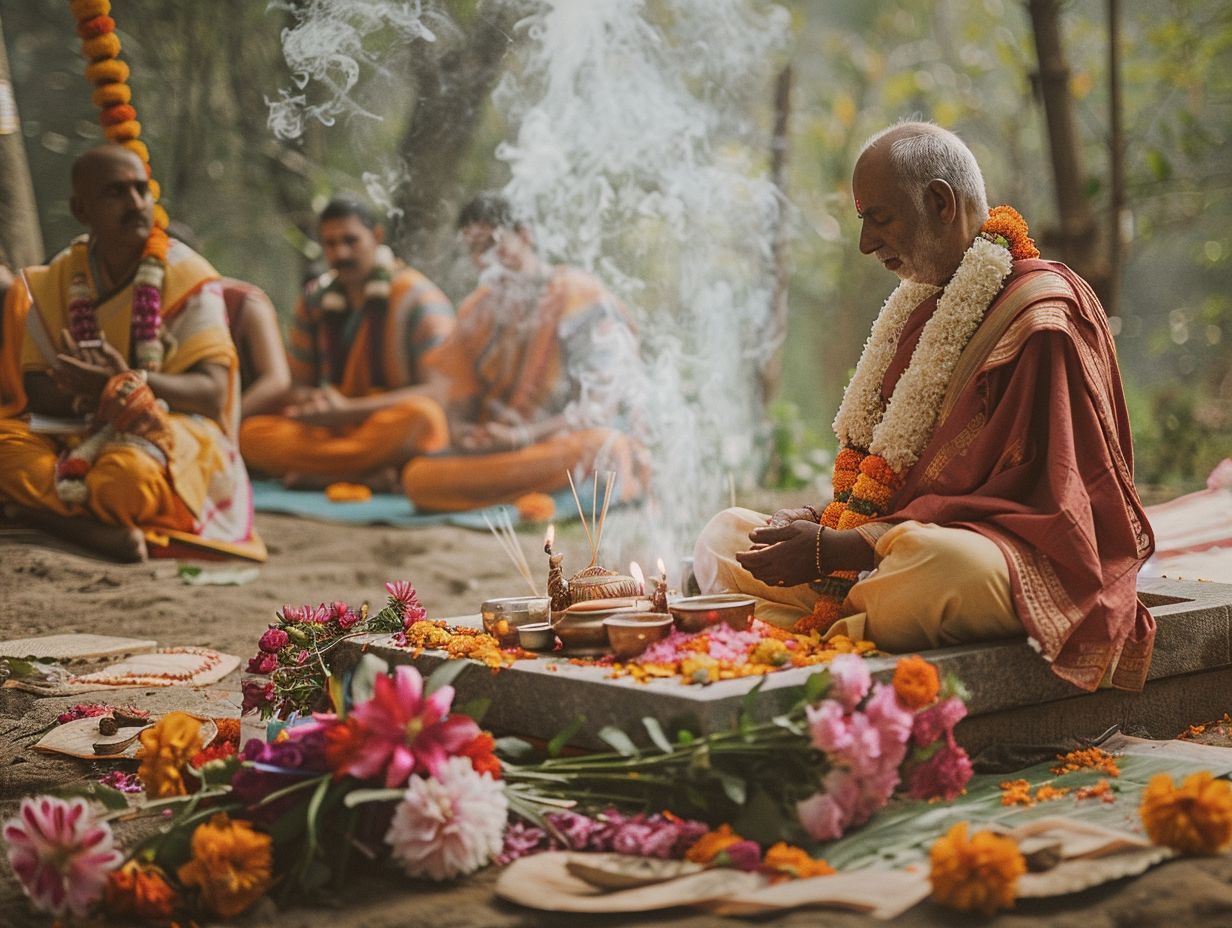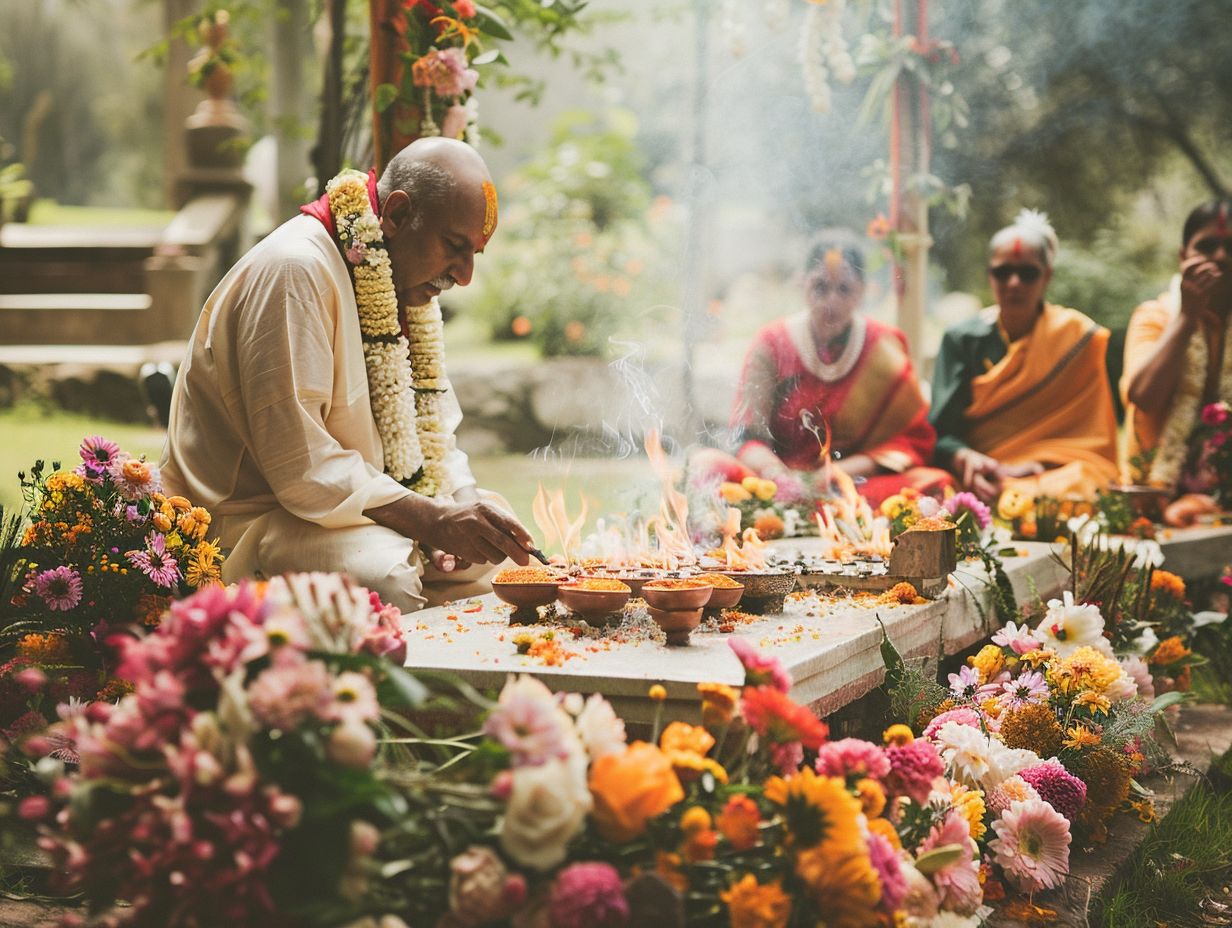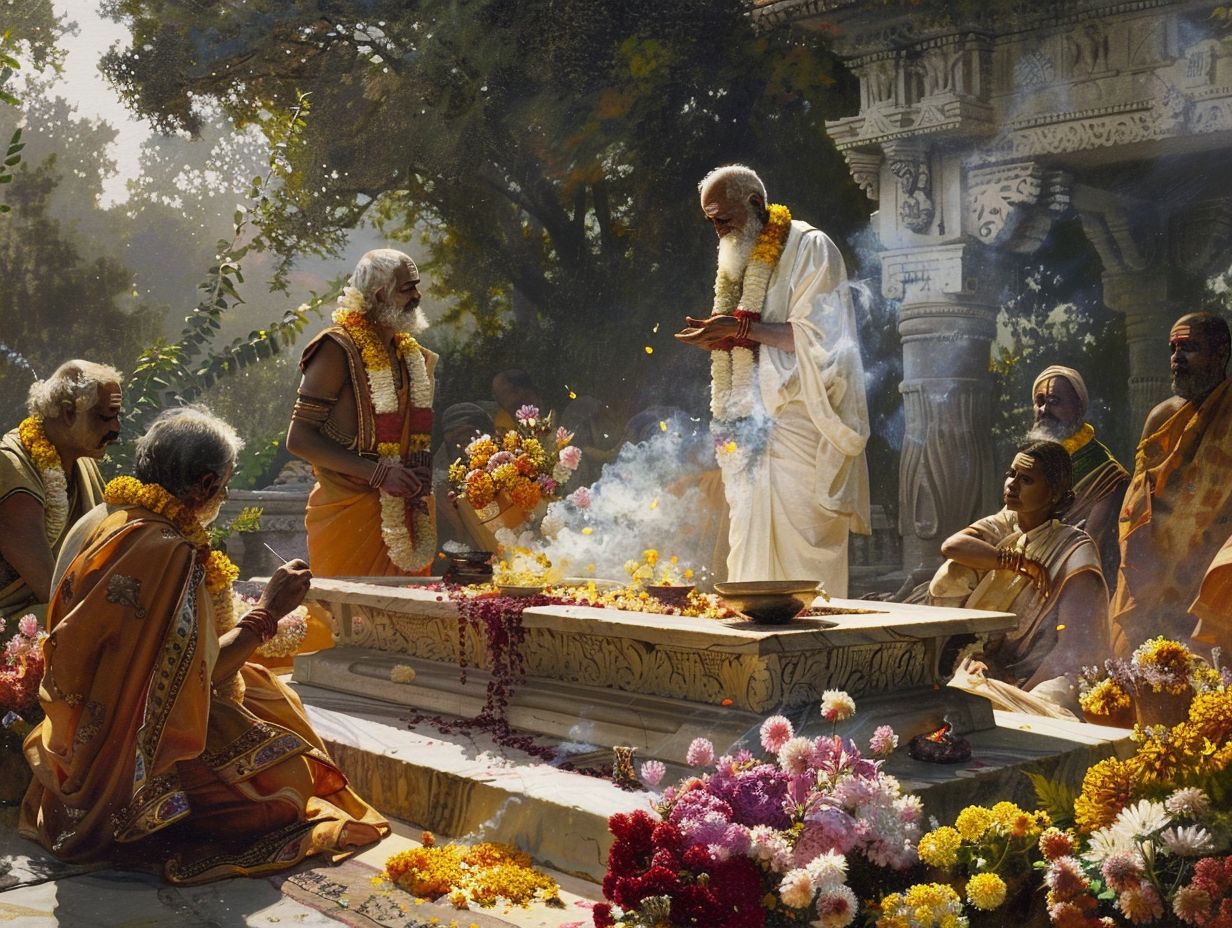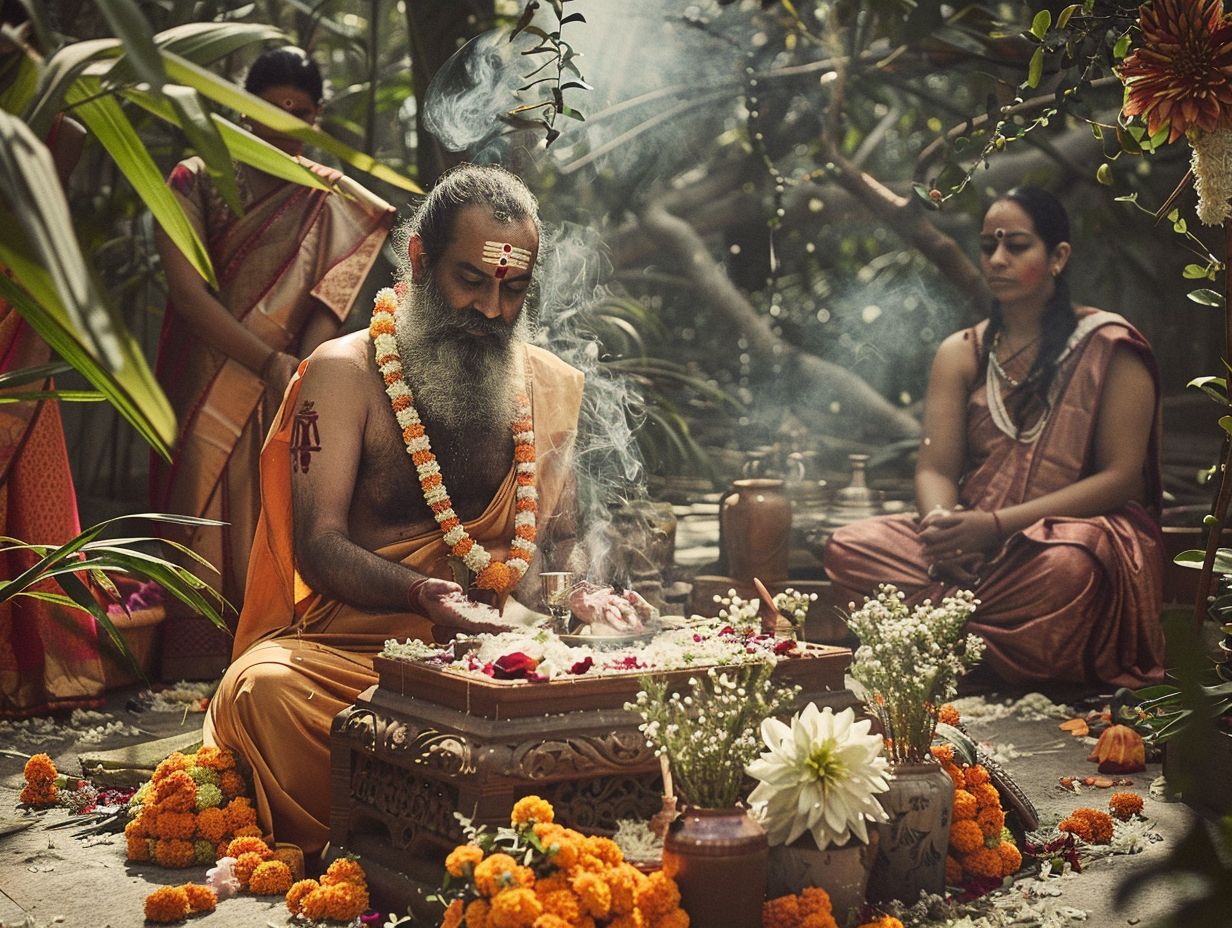The Importance of Vedic Rituals in Mimamsa
Mimamsa, a foundational philosophy within Hinduism, underscores the importance of Vedic rituals as vital to comprehending and engaging with the Vedas. This exploration delves into the intricacies of Mimamsa, examining the various types of Vedic rituals, their purposes, and the spiritual benefits they bestow.
The discussion will illuminate how these rituals cultivate harmony in daily life while preserving cultural traditions for future generations. The profound connection between Mimamsa and the practice of Vedic rituals will be unveiled, revealing their enduring significance in the spiritual and cultural landscape.
What is Mimamsa?

Mimamsa, an esteemed philosophical school within Indian philosophy, centers on the interpretation of Vedic texts, highlighting the crucial role of Vedic rituals and ritualistic actions in upholding dharma. This profound system of thought, deeply entrenched in the Brahmanas, offers a comprehensive framework for understanding the ethical conduct and philosophical inquiry that underlie ritual performance.
It underscores the importance of Vedic traditions within the cosmic order. By diving into the intricate layers of ritualistic symbolism and the philosophy of action, Mimamsa emerges as an essential lens through which to explore the foundational principles of Vedic culture and its revered sacred texts.
What are Vedic Rituals?
Vedic rituals represent a profound tapestry of spiritual practices deeply embedded within the Vedic tradition, characterized by intricate sacrificial rites, worship, and puja. These rituals, grounded in ancient Vedic scriptures, are designed to fulfill both individual and communal dharma, creating a sacred bond between the worshipper and the divine.
They highlight the significance of ritual purity and the execution of yajnas as pathways to spiritual enlightenment and divine intervention, thereby preserving the continuity of cultural heritage and the intricate framework of Vedic cosmology.
What is the Purpose of Vedic Rituals?
The purpose of Vedic rituals transcends mere performance; they are intricately designed to cultivate spiritual enlightenment, achieve karmic balance, and establish a divine connection. These rituals embody a profound philosophy of action, illustrating the ethical conduct expected from practitioners and their unwavering commitment to dharma through ritual observance and sacred actions.
Through the elaborate choreography of mantras, offerings, and meditative focus, these practices serve as pathways for individuals to explore the profound truths of existence and self. By engaging in Vedic rituals, practitioners often find a deep sense of belonging within their communities, enhancing collective karma and reinforcing shared spiritual aspirations.
Ultimately, these time-honored traditions foster personal transformation, providing a means to transcend ego-driven desires, nurture mindfulness, and cultivate a holistic awareness that benefits both the individual and society at large.
What are the Different Types of Vedic Rituals?
Vedic rituals can be classified into several distinct categories, such as agricultural rites, domestic rituals, sacrificial rituals, and communal rituals, each fulfilling specific roles within the rich tapestry of Vedic culture. These varied forms of ritualistic practice illustrate the principles of ritual performance theory, emphasizing the complex interconnections between the sacred and the mundane.
Agricultural rites, for instance, are conducted to invoke divine blessings for a bountiful harvest, exemplifying the deep reliance of farmers on cosmic forces. In contrast, domestic rituals typically take place within the household, focusing on cultivating harmony and ensuring protection for family members, thereby strengthening familial bonds.
Sacrificial rituals often fulfill a communal function, where offerings are presented to deities to secure spiritual merit for the entire community. Meanwhile, communal rituals, such as festivals, not only commemorate significant events in the agricultural calendar but also reinforce social connections among participants.
Through these diverse practices, one can observe how Vedic philosophy intricately weaves itself into daily life, merging spirituality with socio-cultural development and contributing to a cohesive community identity.
How do Vedic Rituals Relate to Mimamsa?
The relationship between Vedic rituals and Mimamsa philosophy is deeply significant, with Mimamsa offering the foundational theories that shape the ethical conduct and procedural dimensions of these rituals.
This philosophical exploration of Vedic texts not only clarifies the mechanics of ritual performance but also underscores the essential role of intent in these spiritual practices. It reflects the interpretative frameworks laid down by ancient sages, showcasing a rich tapestry of thought that intertwines ethics, procedure, and spiritual meaning.
What is the Role of Vedic Rituals in Mimamsa Philosophy?
Within the realm of Mimamsa philosophy, Vedic rituals hold a position of paramount importance, regarded as vital instruments for achieving dharma and upholding the cosmic order. The Brahmanas, which form a subset of Vedic texts, delve into the profound significance of these rituals, outlining the necessary performances that ensure ethical conduct and the balancing of karma in both personal and communal spheres.
These rituals extend far beyond mere ceremonial actions; they encapsulate a rich philosophical understanding intricately woven into the very fabric of society. By meticulously adhering to the prescribed Vedic practices, individuals embark on a journey that not only reinforces their moral integrity but also nurtures a profound sense of responsibility towards their community and the universe as a whole.
The philosophical principles of Mimamsa articulate that such actions contribute to a harmonious existence, linking individual deeds to wider ethical ramifications. This insight cultivates a commitment to righteousness that transcends personal interests, fostering collective well-being and safeguarding the sanctity of cosmic order for generations to come.
How do Vedic Rituals Help in Understanding the Vedas?

Vedic rituals serve as a vital portal for comprehending the Vedas, embodying the hermeneutics essential for interpreting sacred texts and unveiling their deeper meanings. By immersing themselves in these ritualistic practices, individuals can attain spiritual enlightenment and cultivate a profound appreciation for Vedic philosophy and its teachings.
These rituals transcend mere ceremony; they function as essential tools that aid in decoding the intricate ideas and metaphysical concepts woven throughout the Vedic scriptures. Through repeated performance and thoughtful contemplation, practitioners establish a connection between the teachings and their own life experiences, thus enriching their spiritual growth.
Such practices foster a dialogue with the expansive philosophical discourse surrounding the Vedas, encouraging a holistic understanding that surpasses both text and tradition. This dynamic interplay between ritual and interpretation nurtures a more sophisticated grasp of the spiritual insights embedded within the Vedas, ultimately guiding individuals along their journey toward heightened consciousness.
What are the Benefits of Performing Vedic Rituals?
Engaging in Vedic rituals presents a wealth of benefits, encompassing spiritual and psychological advantages while also promoting communal harmony and nurturing positive karma.
These rituals, rich in tradition and infused with deep spiritual significance, offer participants a profound sense of purpose and a meaningful connection to their cultural heritage.
How do Vedic Rituals Bring Harmony and Balance to Life?
Vedic rituals serve as a crucial mechanism for fostering harmony and balance in life, adeptly aligning individuals with their dharma while nurturing a profound sense of spiritual connection. Through committed engagement in these ritual practices, participants may experience an elevation in ritual efficacy, give the power toing them to navigate life’s challenges with enhanced ease and purpose.
These venerable traditions encompass a broad spectrum of spiritual endeavors that not only facilitate personal growth but also fortify communal bonds. By immersing themselves in these rituals, practitioners uncover pathways to deepen their comprehension of life’s intrinsic rhythms, ultimately leading to a more centered and fulfilling existence.
The focus on collective participation during these ceremonies cultivates a supportive atmosphere that champions shared values and collective well-being.
As individuals align with their higher purpose through these sacred acts, they contribute to the creation of a harmonious community, illustrating the fundamental role that dharma plays in the fabric of daily life. Such profound experiences often inspire transformative changes, reinforcing the intricate interconnectedness of personal fulfillment and communal harmony.
What are the Spiritual Benefits of Vedic Rituals?
The spiritual benefits of Vedic rituals are profound, facilitating meditation, deepening divine connections, and promoting spiritual awakening. Through participation in these sacred practices, individuals cultivate a heightened sense of inner peace and alignment with universal energies.
These rituals act as a bridge to higher consciousness, enabling participants to experience transcendent moments that often lead to transformative insights. Engaging in Vedic practices not only enriches one’s meditation experience but also aids in dissolving emotional barriers, resulting in enhanced self-awareness and personal growth.
As practitioners immerse themselves in the rhythmic chants and vibrant symbols of Vedic traditions, the synergistic effect fosters a stronger bond with the divine while nurturing a spirit of compassion. Ultimately, these sacred rituals guide seekers on their journey toward spiritual enlightenment, illuminating the path with profound wisdom and insights.
What are the Steps to Performing Vedic Rituals?
Performing Vedic rituals entails a series of essential steps that guarantee meticulous preparation and execution, underscoring the significance of utilizing suitable materials while grasping the profound meaning of mantras and prayers.
Each phase of this intricate process is carefully crafted to harmonize with the divine order, ensuring the preservation of ritual purity throughout the entire performance.
What are the Materials Required for Vedic Rituals?
The materials required for conducting Vedic rituals encompass a variety of sacred items that are essential for upholding ritual purity and facilitating offerings to the divine. Prescribed in ancient Vedic texts, these materials play a pivotal role in ensuring both the effectiveness and sanctity of the rituals performed.
Among these sacred items, ghee, grains, and specific herbs hold profound significance. Ghee, for instance, transcends its role as a mere cooking ingredient; it serves as a medium to convey offerings to the fire, symbolizing purity and the essence of devotion. Grains, often viewed as embodiments of prosperity and sustenance, are vital for invoking blessings in abundance. Furthermore, the selection of certain herbs, each chosen for its unique properties, fosters a deeper connection to nature and enhances the spiritual atmosphere of the ritual.
This meticulous selection and preparation of materials not only reflect a commitment to sacred traditions but also reinforce the importance of intention and respect within the practice.
What is the Significance of Mantras and Prayers in Vedic Rituals?

Mantras and prayers carry profound significance within Vedic rituals, serving as powerful instruments for invocation and establishing a spiritual resonance with the divine. Grounded in the textual authority of Vedic scriptures, these verbal expressions are essential for channeling energy and intention throughout the ritual performance.
Originating from ancient traditions, these sacred sounds and verses are believed to encapsulate meanings that extend far beyond mere verbal articulation. Each mantra, meticulously composed of specific syllables and phonetics, is thought to possess unique vibrational qualities that align practitioners with elevated states of consciousness and forge a connection to the cosmic source.
The repetition of these mantras cultivates a meditative atmosphere, enhancing focus and deepening one’s spiritual connection. In the broader context of Vedic teachings, the use of mantras and prayers transcends mere spiritual communication; it serves as a pathway to cultivate inner peace and harmony, reinforcing the transformative power inherent in the rituals themselves.
How Can One Incorporate Vedic Rituals in Daily Life?
Incorporating Vedic rituals into daily life significantly enhances an individual’s spiritual discipline while fostering a profound connection to cultural heritage. When practiced consistently, these simple rituals impart a sense of purpose and mindfulness, enriching the spiritual journey and facilitating deeper meditation practices.
What are Some Simple Vedic Rituals to Practice at Home?
Simple Vedic rituals can be effortlessly integrated into daily life, providing individuals with ample opportunities for spirituality and mindfulness right at home. Practices such as lighting a diya, chanting mantras, or performing a small puja can transform a space into a sanctuary that nurtures spiritual growth and deeper connections.
By dedicating just a few minutes each day to these rituals, one can cultivate a profound sense of peace and purpose. For example, lighting a diya not only symbolizes the dispelling of darkness but also invites positivity and harmony into one s environment. Similarly, chanting mantras serves as a potent tool for meditation, enhancing focus and fostering inner tranquility.
A small puja can express gratitude, allowing individuals to connect with the divine and appreciate the abundance present in their lives. These simple yet profound Vedic rituals promote a mindful existence, enriching the spiritual journey without demanding extensive time or resources.
How Can Vedic Rituals Help in Maintaining Mental and Emotional Well-being?
Vedic rituals possess a remarkable capacity to enhance mental and emotional well-being by weaving together meditation and spiritual practices that foster inner peace and equilibrium. Through consistent engagement in these rituals, individuals can attain reduced stress levels, heightened focus, and a profound sense of emotional stability.
These practices serve as a powerful mechanism for emotional healing, enabling participants to confront and navigate their turbulent feelings with greater efficacy. By nurturing a deeper connection with oneself, these spiritual exercises offer a pathway for reflection and introspection, ultimately cultivating resilience in the face of life’s challenges.
Regular participation in such rituals not only alleviates stress but also promotes a heightened state of awareness, resulting in improved emotional responses and behavioral patterns. The holistic advantages of Vedic traditions can significantly transform one s approach to daily pressures, fostering a healthier, more balanced life characterized by tranquility and strength.
What is the Role of Vedic Rituals in Preserving Tradition and Culture?
Vedic rituals hold a pivotal position in the preservation of tradition and cultural heritage, acting as a vital link that unites generations within the ritual community. These practices not only strengthen communal identity but also facilitate the transmission of esoteric knowledge and cultural values that characterize the Vedic way of life.
How do Vedic Rituals Connect People to their Ancestral Heritage?
Vedic rituals serve as a profound means for individuals to connect with their ancestral heritage, reinforcing cultural identity and spiritual lineage through communal practices. These rituals, deeply entrenched in tradition, allow individuals to honor their forebears while fostering a sense of belonging and continuity within the Vedic community.
In participating in these time-honored ceremonies, communities unite to celebrate their shared beliefs and to remember and uphold the teachings and values that have been passed down through generations. Such gatherings often feature collective chanting, offerings, and vibrant exchanges that illuminate the essence of familial bonds and shared histories.
As participants engage in these sacred rites, they cultivate a deeper understanding of their roots, ensuring that the wisdom of their ancestors remains alive.
This collective remembrance not only nurtures personal spiritual growth but also strengthens communal ties, truly embodying the essence of their cultural identity.
What is the Importance of Passing Down Vedic Rituals to Future Generations?

Passing down Vedic rituals to future generations is crucial for ensuring cultural continuity and preserving the profound spiritual teachings inherent in these practices. By sharing this knowledge, communities can sustain their heritage while fostering a deeper understanding of Vedic traditions within the contemporary context.
This transfer of wisdom is integral to reinforcing family bonds and linking individuals to their roots, as families often serve as the primary conduit for this educational journey. When children observe their parents and elders actively engaging in these rituals, they cultivate a sense of belonging and respect for their cultural identity. The support of the community further enriches this learning process, creating an environment where these spiritual values can flourish and evolve.
Together, families and communities not only protect the essence of Vedic rituals but also inspire younger generations to embrace and adapt these practices, ensuring their relevance and significance in today s fast-paced world.
Frequently Asked Questions
What is Mimamsa and why is it important?
Mimamsa is one of the six orthodox schools of Hindu philosophy, focusing on the interpretation of the Vedas. It is important because it helps us understand the significance of Vedic rituals in our lives and how they are linked to our spiritual growth.
What are Vedic rituals and how do they relate to Mimamsa?
Vedic rituals are religious ceremonies and practices described in the Vedas, the oldest sacred texts of Hinduism. Mimamsa provides a philosophical framework for understanding the meaning and purpose of these rituals in the context of our daily lives.
How do Vedic rituals contribute to our spiritual well-being?
Vedic rituals are believed to have a purifying effect on our mind, body, and soul. They help us connect with the divine and cultivate positive qualities such as devotion, gratitude, and discipline. Mimamsa emphasizes the importance of these rituals in achieving spiritual growth.
Why is the proper performance of Vedic rituals important?
Mimamsa stresses the importance of performing Vedic rituals correctly, following specific rules and procedures. This is because the ritualistic actions have a deeper symbolic meaning and significance, and any mistakes or omissions can affect the desired outcome.
How do Vedic rituals help maintain the balance between individual and societal needs?
Mimamsa recognizes that Vedic rituals not only have personal benefits but also contribute to the well-being of society. These rituals are often performed as part of larger community events, promoting unity and harmony among individuals and strengthening social bonds.
What role do Vedic rituals play in preserving our cultural heritage?
Vedic rituals have been passed down through generations and are an integral part of our cultural heritage. Mimamsa highlights the importance of preserving these rituals as they provide a link to our ancient traditions and help us connect with our roots.
